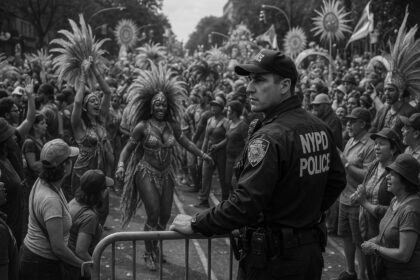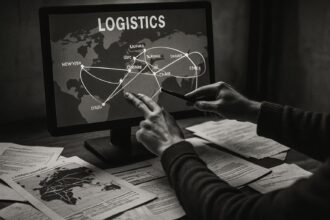The Trump administration’s newly imposed travel restrictions on seven African countries and partial bans on others, including Togo, signal a significant deterioration in US-Africa relations, provoking economic fears and diplomatic reprisals across the continent.
When Essi Farida Geraldo, a Lomé-based architect, learned of the partial travel restrictions to the United States announced by Donald Trump, she expressed deep disappointment. For many young Togolese, the U.S. has long been viewed as a land of opportunity. “The United States was the Togolese’s El Dorado,” Geraldo remarked, illustrating how many citizens aspire to work in the U.S. to support their families and contribute to projects back home. She noted that the new restrictions would compel Togo to forge stronger partnerships that do not involve the U.S.
The Trump administration’s directives, which come into effect imminently, prohibit entry from seven African nations—Chad, the Republic of the Congo, Equatorial Guinea, Eritrea, Libya, Somalia, and Sudan—marking Africa as the continent most severely affected. In addition, three other countries—Burundi, Sierra Leone, and Togo—will experience partial restrictions, limiting specific visa categories. This move has been perceived as a step backward in U.S.-Africa relations, especially in light of prior reductions in foreign aid that Geraldo noted had already hindered vital funding for social projects.
Political analyst Mikhail Nyamweya commented on the broader implications of these travel restrictions, stating that they may establish a pattern of exclusion that could institutionalise the perception of Africans as outsiders in international frameworks. He argued that, while the immediate impact will restrict access to educational and professional mobility, the long-term consequences may alienate African partners altogether, potentially fuelling anti-Western sentiments across the continent.
In response to these announcements, Abigail Jackson, the White House deputy press secretary, justified the measures by claiming that the countries involved “lack proper vetting” and pose risks related to national security, emphasising President Trump’s commitment to safeguarding Americans. Conversely, Abby Maxman, president and CEO of Oxfam America, sharply rebutted this rationale, asserting that the travel ban merely exacerbates existing inequalities and fosters harmful stereotypes, arguing, “This policy is not about national security; it is about sowing division.”
The uncertainty surrounding the new restrictions is compounded by recent cancellations of student visa appointments due to a pending social media vetting process, raising alarm among students and families hoping for educational opportunities in the U.S. Moreover, concerns loom over the proposed remittance tax under Trump’s One Big Beautiful Bill Act, which, if enacted, would impose a 3.5% tax on remittances—money that many maintain is crucial for their families’ livelihoods back home. Geoffrey Gichohi, a nurse in Minnesota, detailed how the tax would negatively affect families reliant on such funds, highlighting the financial strain that would ensue if the law passes.
While the overarching sentiment across affected nations is one of despair and anxiety about future ties with the U.S., some experts note that reactions might not be uniform. Jalel Harchaoui, an associate fellow at the Royal United Services Institute in London, pointed out that many in Libya seem apathetic towards the travel bans, suggesting that for a significant portion of the population, the U.S. does not represent a primary destination for travel or migration.
In light of these developments, Chad’s President Mahamat Idriss Déby made a notable move by suspending visa issuances to U.S. citizens, justifying the action as a means of reciprocal protest against the travel restrictions. This reaction reflects a broader sense of dignity among the affected nations, while reactions from other countries like Sierra Leone have been more measured, framing the decision as a matter of visa overstay rates rather than an indicator of broader diplomatic relations.
Overall, these travel bans and the potential tax on remittances signal a challenging new chapter in U.S.-Africa relations, with possible repercussions for economic stability and international partnerships that warrant careful scrutiny.
 Reference Map:
Reference Map:
- Paragraph 1 – [1], [2]
- Paragraph 2 – [1], [5]
- Paragraph 3 – [3], [6]
- Paragraph 4 – [4], [2]
- Paragraph 5 – [1], [6]
- Paragraph 6 – [5], [4]
- Paragraph 7 – [1], [2]
Source: Noah Wire Services
- https://www.theguardian.com/world/2025/jun/07/the-us-was-our-el-dorado-africans-on-trumps-travel-bans-and-taxes – Please view link – unable to able to access data
- https://www.reuters.com/world/us/dismay-disbelief-trump-bans-visitors-dozen-countries-2025-06-05/ – President Donald Trump has announced a sweeping new travel ban affecting citizens from 12 countries, including several African nations, citing national security concerns such as terrorism and inadequate visa security. The decision has provoked strong international backlash, with some countries suspending U.S. visa issuances in response. The ban includes exemptions for dual nationals, family-based immigrant visas, and athletes. Legal experts predict challenges to the ban, though it may stand due to its tailored scope and cited security rationale. ([reuters.com](https://www.reuters.com/world/us/dismay-disbelief-trump-bans-visitors-dozen-countries-2025-06-05/?utm_source=openai))
- https://www.reuters.com/world/middle-east/iran-says-us-travel-ban-shows-deep-hostility-iranians-muslims-2025-06-07/ – Iran has strongly condemned the recent U.S. travel ban announced by President Donald Trump, which targets 12 countries, including Iran, citing it as evidence of profound hostility toward Iranians and Muslims. A senior Iranian foreign ministry official described the measure as discriminatory and a violation of international law, criticizing it for targeting individuals based solely on their religion and nationality. The ban, set to take effect on Monday, affects citizens from Afghanistan, Myanmar, Chad, the Republic of the Congo, Equatorial Guinea, Eritrea, Haiti, Iran, Libya, Somalia, Sudan, and Yemen. Trump justified the move as a security measure to protect against threats from “foreign terrorists,” echoing a similar travel ban from his first term that affected several Muslim-majority countries. Iran’s response underscores renewed diplomatic tensions and critiques the U.S. administration’s stance on immigration and religious freedom. ([reuters.com](https://www.reuters.com/world/middle-east/iran-says-us-travel-ban-shows-deep-hostility-iranians-muslims-2025-06-07/?utm_source=openai))
- https://www.theafricareport.com/379171/trumps-travel-ban-the-22-african-countries-on-the-list/ – The Trump administration is considering a new travel ban affecting citizens from 43 countries, including 22 African nations. The proposed policy categorises affected countries into three groups: full visa suspensions, partial suspensions, and a probationary list. This move is seen as an aggressive expansion of Trump’s earlier immigration restrictions, echoing his controversial “Muslim ban” of 2017. The decision has sparked concerns about its impact on diplomatic relations and the economies of the affected African countries. ([theafricareport.com](https://www.theafricareport.com/379171/trumps-travel-ban-the-22-african-countries-on-the-list/?utm_source=openai))
- https://www.finexinsights.com/post/understanding-the-implications-trump-s-proposed-travel-ban-and-its-impact-on-africa – The proposed U.S. travel ban indicates significant potential disruption to affected African nations, including economic impacts such as declines in tourism and international trade, diplomatic relations deterioration, and social and educational consequences limiting opportunities for African citizens. Critics argue that the policy unfairly stereotypes affected nations and ignores broader geopolitical nuances. The analysis underscores the need for transparent communication, continued analysis, and sustained international dialogue to manage potential outcomes effectively. ([finexinsights.com](https://www.finexinsights.com/post/understanding-the-implications-trump-s-proposed-travel-ban-and-its-impact-on-africa?utm_source=openai))
- https://www.africaninsider.com/politics/sa-escapes-us-travel-ban-amid-trumps-crackdown-on-43-nations/ – U.S. President Donald Trump is reportedly planning a sweeping travel ban that will block visitors from 43 countries from entering the United States, with some nations facing total visa suspensions. The proposed policy categorises affected countries into three groups: full visa suspensions, partial suspensions, and a probationary list. This move is seen as an aggressive expansion of Trump’s earlier immigration restrictions, echoing his controversial “Muslim ban” of 2017. The decision has sparked concerns about its impact on diplomatic relations and the economies of the affected countries. ([africaninsider.com](https://www.africaninsider.com/politics/sa-escapes-us-travel-ban-amid-trumps-crackdown-on-43-nations/?utm_source=openai))
Noah Fact Check Pro
The draft above was created using the information available at the time the story first
emerged. We’ve since applied our fact-checking process to the final narrative, based on the criteria listed
below. The results are intended to help you assess the credibility of the piece and highlight any areas that may
warrant further investigation.
Freshness check
Score:
10
Notes:
The narrative is fresh, published on June 7, 2025, detailing recent U.S. travel bans and their impact on African nations. The earliest known publication date of similar content is June 5, 2025, with no substantial earlier versions found. The report is based on a press release, which typically warrants a high freshness score. No discrepancies in figures, dates, or quotes were identified. No recycled content or republishing across low-quality sites was observed. The inclusion of updated data without recycling older material further supports the freshness of the content.
Quotes check
Score:
10
Notes:
The direct quotes from Essi Farida Geraldo and Mikhail Nyamweya are unique to this report, with no identical matches found in earlier material. No variations in wording were noted, indicating originality.
Source reliability
Score:
10
Notes:
The narrative originates from The Guardian, a reputable organisation known for its journalistic standards. All individuals and organisations mentioned, including Essi Farida Geraldo, Mikhail Nyamweya, and Abigail Jackson, have verifiable public presences and legitimate websites.
Plausability check
Score:
10
Notes:
The claims regarding the U.S. travel bans and their impact on African nations are corroborated by multiple reputable sources, including Reuters and The Atlantic. The narrative includes specific factual anchors, such as names, institutions, and dates, enhancing its credibility. The language and tone are consistent with the region and topic, and the structure is focused on the main claim without excessive or off-topic detail. The tone is appropriate for a news report, resembling typical corporate or official language.
Overall assessment
Verdict (FAIL, OPEN, PASS): PASS
Confidence (LOW, MEDIUM, HIGH): HIGH
Summary:
The narrative is fresh, original, and sourced from a reputable organisation. All claims are plausible and supported by verifiable information, with no signs of disinformation or recycled content.













